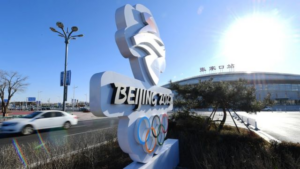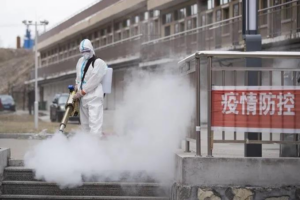Widgetized Section
Go to Admin » Appearance » Widgets » and move Gabfire Widget: Social into that MastheadOverlay zone
Will China ease entry restrictions as The Beijing Winter Olympics approach?
With talk of “zero clearing” and coexisting with novel coronavirus in China continuing, perhaps the Beijing Winter Olympics in February 2022 will be the time for China to “reopen its doors.”
That’s the prediction from Zeng Guang, a member of the High-level expert group of China’s National Health Commission and chief scientist of epidemiology at the Chinese Center for Disease Control and Prevention. It was also the first time since former Health minister Gao Qiang spoke out forcefully in favor of eliminating the virus that Chinese officials had relented to the idea that China could ease its strict entry controls, but not yet.
Zhang Wenhong, director of the Department of Infectious Diseases at Huashan Hospital affiliated to Fudan University in Shanghai, who is at the center of public opinion, posted on His Weibo account on the evening of August 18, “The international fight against the epidemic is still very severe, and China still faces a huge challenge from the epidemic. But we must have the firm conviction that the strategy that our country is pursuing is the one that is best for us right now. ‘You don’t know if the shoes fit until you wear them.'”
About a month ago, he called for China to “co-exist with novel coronavirus”, which triggered discussions in China about the route of fighting the virus. After a month of discussions, a panel of experts from China’s National Health Commission, represented by Zeng Guang, eased up and raised the possibility of the next stage of liberalization. Zhang Wenhong, who originally advocated coexistence with the virus, reaffirmed China’s current anti-epidemic strategy, but no longer mentioned coexistence in black and white. There seems to be a consensus between the Chinese authorities, who insist on zero, and experts who live with the virus.
China: “must resolutely clear zero”
In a recent interview with Ifeng.com, Zeng guang said that China must “resolutely clear the epidemic” at this stage, and that “China will change its epidemic prevention strategy and choose to open up after the domestic defense line of immunization is strengthened.” Zeng said next year’s Beijing Winter Olympics will be an opportunity to try to change the strategy, and China is making preparations for it in a calm and objective manner.
Since the outbreak at Lukou Airport in Nanjing in late July, China has spread to more than a dozen provinces and cities across the country. At its peak, the outbreak caused by the mutant delta virus reached more than 100 new cases in China in a single day, which is considered the most severe situation China has faced since the outbreak was brought under control in 2020.
China’s 31 provinces (autonomous regions and municipalities directly under the Central Government) had no local additions as of 0:00 to 24:00 on August 22. Meanwhile, some cities and areas have been unsealed. The head of China’s National Health Commission, Ma Xiaowei, said the current outbreak should be brought under control by the end of August.
According to the current number of new cases, China has initially contained this wave of epidemic. It has followed the Chinese-style mode of fighting COVID-19: sealed off areas/cities, large-scale nucleic acid testing and strict TWO-DIMENSIONAL code inspection.
While preventing and controlling the epidemic, a number of officials and officials in charge across the country have been punished for their failure to contain the epidemic.
From July 20 to August 10, more than 40 public officials were held accountable for their failure to contain and control the outbreak. Among them, Hu Wanjin, vice mayor of Nanjing, the city where the outbreak occurred, was given a demerit and Fang Zhongyou, party secretary of Nanjing’s Health Commission, was fired. Feng Jun, party secretary and chairman of Eastern Airport Group Co., the parent company of Nanjing Lukou Airport, and Xu Yong, deputy Party secretary and general manager, are under investigation for suspected serious violations of discipline and law.
What can be done before 2022?
There is a general consensus that vaccination rates should be increased.
As of August 21, 2021, A total of 1.93 billion doses of vaccine had been administered in China, with the exact number of fully vaccinated people unknown. China has now approved emergency use of the vaccine for young people aged 3-17, and has promoted the vaccination program for young people aged 12-17 in many places.
Chongqing, a municipality in southwest China, said people over the age of 18 who have not been vaccinated without reason in some of its districts and counties may be included in their credit records in an effort to improve vaccination coverage.
On social media site Weibo, netizens commented that “[The Chongqing district and county government] misused its credibility record. These government officials did nothing to save trouble and were lazy in their politics.” “Voluntary vaccination is a big joke,” said another. Some netizens criticized the move as a violation of human rights. China’s state-run People’s Daily said on Aug. 22 that the move “may be carried out too hastily and will bring inconvenience to some people’s lives.”
Similar to the Tokyo Games, the upcoming Winter Games in Beijing are facing a debate over whether to allow spectators.
Chen Zhengming, a professor of epidemiology at the University of Oxford, previously told the BBC that China’s key high-risk groups — the elderly and people with underlying medical conditions — were not being effectively protected. This is where the Chinese vaccine clinical trials were initially designed to fall short.
Zeng guang also mentioned that one of the reasons why China is sticking to the zero policy is that “China has a large elderly population, which is the largest absolute number of elderly people in the world. We also have a large number of chronic diseases, which is our national condition.”
Chen suggested that China introduce foreign vaccines that have already covered such high-risk groups in the early stages of clinical design. Zeng also said That China should not only rely on the inactivated vaccines it currently has, but should speed up the approval of vaccines, including vaccines from Both China and overseas cooperation.
China is expected to approve the first foreign vaccine in July, according to global Times, a Chinese state-run tabloid, after Fosun revealed it was preparing to import Germany’s BioNTech vaccine. But as of press time, this information has not been confirmed.
Over the past year or so, wearing a medical mask has become an integral part of Chinese People’s Daily life.
In addition, antibody levels in vaccinated people decreased in response to the threat of the mutant virus Delta. Xu Shu-cheong, chair professor of respiratory System at the Chinese University of Hong Kong, was surprised to find that antibody levels in people who received sinovac’s vaccine were often or insufficient, and had dropped to low levels within months.
On August 18, Xu’s team gave a third injection to some people, half of whom received sinovac vaccine, and the other half received a combination of fubetai vaccine. He hopes to help the government understand the performance of antibody levels in mixed vaccines.
With less than half a year to go before the Opening of the Beijing Winter Olympics, in addition to increasing vaccination rates and introducing domestic brands, enhanced vaccination or a mix of vaccines may also be considered in China.



